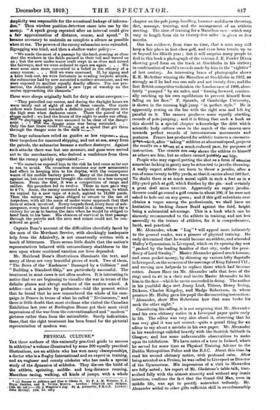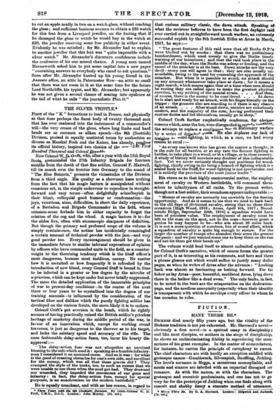PHYSICAL CULTURE.*
TEE three authors of this eminently practical guide to success in athletics,= a volume illuminated by some 200 equally practical illustrations, are an athlete who has won many championships, a doctor who is a Rugby International and an expert in training, and an engineer and county cricketer who has made a special study of the dynamics of athletics. They discuss the build of the athlete, sprinting, middleand long-distance running, Marathon racing, walking, all kinds of jumps, with a whole chapter on the pole jump, hurdling, hammerand discus-throwing, diet, massage, training, and tho management of an athletic
meeting. The time of training for a Marathon race—which may vary in length from six to twenty-five miles—is given as five months.
One has evidence, from time to time, that a man may still keep a fair place in first-class golf, and even lawn tennis, up to
or beyond his fiftieth year ; but it will surprise many people to find in this book a photograph of the veteran J. E. Fowler Dixon showing good form on the track at Stockholm in his sixties ;
in confirmation of world's records made by him in the "eighties" of last century. An interesting brace of photographs shows K. K. McArthur winning the Marathon at Stockholm in 1912, as strongly as,if he had run one mile and not twenty-five; and the first British competitor to finish in the London race of 1908, absolutely " pumped " by six miles, and " leaning forward, continually catching up his own equilibrium to prevent himself from falling on his face." F. Sprowle, of Cambridge University, is shown in the running high jump " in perfect style." He is apparently resting on the bar with the right arm and left leg parallel to it. The camera produces some equally startling records of pole-jumping ; and it is fitting that such a book as this should in a special chapter acknowledge the debt which scientific body culture owes to the march of the camera-men towards perfect records of instantaneous movements and postures. France has produced for athletic trainers a cinemato8a•liareialch. after " taking " athletes at abnormal speed, projects the results on a Otnaen at a much-reduced pace, for purposes of instruction. The camera not eat" shows the athlete to himself as others see him, but as others cannot possibly ass him,
People who may regard putting the shot as a form of axerelae somewhat lacking in gaiety may be attracted to javelin-throwing. A really expert athlete can learn to throw a javelin, after a run of some twenty to fifty yards, so that it carries about 140 feet. No doubt there is as much moral uplift in such a feat as in a fifty-yard pitch at golf, which finishes by the pin—and certainly a great deal more exercise. Apparently an expert javelinthrower could go round a golf course in about 100, if he were not asked to hole out on any green ; and if this golf substitute ever obtains a vogue among the professionals, we shall have no hesitation in backing James Braid against the field, height being a substantial advantage. This is a book which can be sincerely recommended to the athlete in training, and not less assuredly to the trainer of athletes, for it is comprehensive, lucid, and practical.
Mr. Alexander, wham " Log" I will appeal more intimately to the general reader, was a pioneer of physical training. He early determined that he would become an athlete, and attended Miley's Gymnasium iu Liverpool, which on its opening day was " packed by the leading families of that city, under the presidency of Lord Stanley." Master Alexander gained much honour, and some pocket-money, by shinning up various lofty flagstaffs in Liverpool, on the occasion of the marriage of King Edward VII., and reeving new halyards to replace those which had become rotten. James Mace (as Mr. Alexander calls that hero of the ring) used to sit in a chair and invite Master Alexander to hit him in the face—which he never succeeded in doing. The author in his youthful days met Jenny Lind, Titiens, Henry Irving, Dickens, Charles Kingsley, and Madge Robertson, in whose presence Mr. Hulley gave his pupil the disconcertinginstruction: " Alexander, show Miss Robertson how that man broke his neck the other night." Considering his calling, it is not surprising that Mr. Alexander read his own obituary notice in a Liverpool paper quite early in life. The editor was very nice about it, observing that ho was very glad it was not correct—quite a genial thing for an editor to say about a mistake in his own paper. Mr. Alexander in his wanderings collided heavily with the Scottish Sabbath in Glasgow, and has some unfavourable observations to make upon its inhibitions. We have notes of a tour in Ireland, where he served for some time as Physical Training Adviser to the Dublin Metropolitan Police and the R.I.C. About this time he read his second obituary notice, with profound calm. After being arrested as a Fenian, he was called to Liverpool as Director of the Gymnasium. His impressions of a visit to Hawarden are fully noted ; his report of Mr. Gladstone's table-talk, transcribed fully with the utmost sincerity and without any ironic intention, confirms the fact that the Grand Old Man, even in middle life, was apt to pontifa somewhat tediously. Mr. Alexander added to other gifts sufficient skill in swordsmanship
to cut an apple neatly in two on a watch-glass, without cracking the glass ; and sufficient business acumen to obtain a £25 watch for this feat from a Liverpool jeweller, on the footing that if he damaged the glass or watch he would buy in the watch at £20, the jeweller receiving some free publicity in either event. Evidently he was satisfied ; for Mr. Alexander had to explain to another jeweller that this feat was " quite impossible with a silver watch." Mr. Alexander's discursive confidences include the confession of his one missed chance. A young man named Harmsworth asked him to put some capital into a new paper
containing answers to everybody who cared to ask questions." Soon after Mr. Alexander hunted up his young friend in the Answers office, au attic hi Paternoster Row—au attic so small that there was not room in it at the same time for the future Lord Northcliffe, his typist, and Mr. Alexander ; but apparently he was not given a second chance of soaring into opulence at the tail of what he calls " the journalistic Plan-it."



















































 Previous page
Previous page